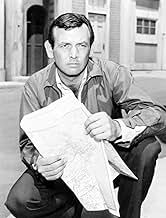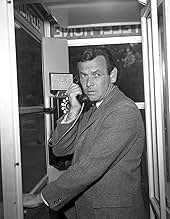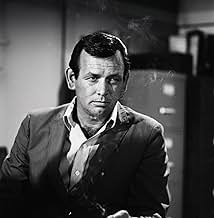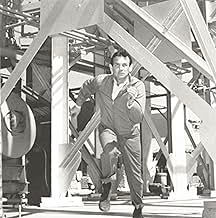After being on the run for 6 months, Richard Kimble falls in love with a beautiful woman who has a young son. She also has a physically abusive, estranged husband, that wants Kimble out of t... Read allAfter being on the run for 6 months, Richard Kimble falls in love with a beautiful woman who has a young son. She also has a physically abusive, estranged husband, that wants Kimble out of town, or dead.After being on the run for 6 months, Richard Kimble falls in love with a beautiful woman who has a young son. She also has a physically abusive, estranged husband, that wants Kimble out of town, or dead.
Paul Birch
- Captain Carpenter
- (uncredited)
Lynn Borden
- Bus Passenger
- (uncredited)
George Bruggeman
- Bar Patron
- (uncredited)
William Conrad
- Narrator
- (voice)
- (uncredited)
Dabbs Greer
- Sgt. Fairfield
- (uncredited)
Donald Losby
- Mark Welles
- (uncredited)
Rod McGaughy
- Bar Patron
- (uncredited)
Bryan O'Byrne
- Ticket Agent
- (uncredited)
Barney Phillips
- Cleve Brown
- (uncredited)
Maudie Prickett
- Miss Blaine (the babysitter)
- (uncredited)
Abigail Shelton
- Evelyn
- (uncredited)
Carl Sklover
- Bar Patron
- (uncredited)
Dick Wesson
- Introductory Narrator
- (voice)
- (uncredited)
- Director
- Writer
- All cast & crew
- Production, box office & more at IMDbPro
8.1448
1
2
3
4
5
6
7
8
9
10
Featured reviews
Fear in a Desert City 9/17/63
This classic series begins with an extended version of its eventual opening as we see Richard Kimble handcuffed to Lt. Gerard in a train, on his way to the death house, (today he'd be on his way to death row for decade or more). The train derails and we see Kimble escaping with the now broken handcuffs. Then we jump 6 months later and Kimble is in Tucson, Arizona. William Conrad's narrator, (sounding much like Mark Hellinger in the 1948 movie of Naked City), tells us it's 6 months later and describes Kimble's plight , traveling the country looking for the one-armed man he thinks killed his wife while avoiding Gerard, who is obsessed with recapturing him. "Another journey, another place. Walk neither too fast nor too slow. Beware the eyes of strangers. Keep moving."
Kimble finds a job as a bartender where he develops a relationship with a piano player (Vera Miles) and a very unwanted feud with her possessive and abusive husband, (Brian Keith). Keith is rich and influential and totally crazy, the last thing Kimble needs in his life. Miles is pretty and sensitive, which is something he does need, but scared. She also has a son who is scared for his mother. Kimble tries to leave with them but fate, of course, moves its huge hand.
I think Kimble sees in this woman and her son the family he could have had, making it particularly poignant. That's why I would like to have seen them return for the finale four years later. I would also like to have heard more of the narration from Conrad, highlighting the story and giving voice to Kimble's thoughts, instead of just describing the beginning and end of episodes, as does for most of the series.
Kimble finds a job as a bartender where he develops a relationship with a piano player (Vera Miles) and a very unwanted feud with her possessive and abusive husband, (Brian Keith). Keith is rich and influential and totally crazy, the last thing Kimble needs in his life. Miles is pretty and sensitive, which is something he does need, but scared. She also has a son who is scared for his mother. Kimble tries to leave with them but fate, of course, moves its huge hand.
I think Kimble sees in this woman and her son the family he could have had, making it particularly poignant. That's why I would like to have seen them return for the finale four years later. I would also like to have heard more of the narration from Conrad, highlighting the story and giving voice to Kimble's thoughts, instead of just describing the beginning and end of episodes, as does for most of the series.
Le Miserable
The first episode of this long-running Quinn Martin television production showcases many of the reasons why it was so successful for so long. Well-written, tautly directed and with a strong cast delivering solid performances, it was fraught with tension from first to last.
It employs the familiar QM template of breaking down the narrative to four roughly equal twelve-minute acts with a short concluding epilogue, normally to set up the next episode. Interestingly and surprisingly for this introduction and unlike the much later feature film which starred Harrison Ford and Tommy Lee Jones, there's no scene-setting opening scene. We don't see the killing of Kimble's wife, far less get a glimpse of the one-armed man he says (and I believe him!) he bumped into at the sequence. It simply starts with the train crash which separates him from his Inspector Javert-like nemesis, Barry Morse's Lt. Gerard.
Escaping to Tuscon, with a change of name and hair colour, Kimble tries to blend into the background until he can get a lead on the real killer but on getting a job as a lowly bartender, he soon gets drawn into a domestic situation involving Vera Miles' single parent pub-pianist, on the run from her jealous and violent ex-husband, played with some devilment by Brian Keith.
It ends as all future episodes must end, with Kimble losing the girl and leaving town, but not before righting wrongs and putting certain situations right and in this particular even signposting intra-marital coercive male behaviour when it was probably less highlighted than it is now.
Jansen is immediately convincing in his character and is well supported by Miles, late of major Hollywood parts , while the direction amply and skilfully draws out the story thanks to an excellent script and some atmospheric noir-esque camera set-ups.
I very much doubt I'll get to watch in my lifetime all the succeeding 119 intervening programmes until the final showdown, as I think it would take Kimble-like devotion on my part to do so, but it was nevertheless cool to check in on the very first episode of such an iconic series.
It employs the familiar QM template of breaking down the narrative to four roughly equal twelve-minute acts with a short concluding epilogue, normally to set up the next episode. Interestingly and surprisingly for this introduction and unlike the much later feature film which starred Harrison Ford and Tommy Lee Jones, there's no scene-setting opening scene. We don't see the killing of Kimble's wife, far less get a glimpse of the one-armed man he says (and I believe him!) he bumped into at the sequence. It simply starts with the train crash which separates him from his Inspector Javert-like nemesis, Barry Morse's Lt. Gerard.
Escaping to Tuscon, with a change of name and hair colour, Kimble tries to blend into the background until he can get a lead on the real killer but on getting a job as a lowly bartender, he soon gets drawn into a domestic situation involving Vera Miles' single parent pub-pianist, on the run from her jealous and violent ex-husband, played with some devilment by Brian Keith.
It ends as all future episodes must end, with Kimble losing the girl and leaving town, but not before righting wrongs and putting certain situations right and in this particular even signposting intra-marital coercive male behaviour when it was probably less highlighted than it is now.
Jansen is immediately convincing in his character and is well supported by Miles, late of major Hollywood parts , while the direction amply and skilfully draws out the story thanks to an excellent script and some atmospheric noir-esque camera set-ups.
I very much doubt I'll get to watch in my lifetime all the succeeding 119 intervening programmes until the final showdown, as I think it would take Kimble-like devotion on my part to do so, but it was nevertheless cool to check in on the very first episode of such an iconic series.
10grubby08
Perfect Match
As an initial episode, the Fugitive series couldn't have generated a better start. Of all the women Dr. Kimble came across over the course of his life on the run, the one most perfectly suited for him IMO was Monica Welles played superbly by actress Vera Miles.
As a finale, I would have loved to see Kimble go back to the very beginning of his journey and rediscover the love he found with Monica and her son. It would have been a fitting ending.
As a finale, I would have loved to see Kimble go back to the very beginning of his journey and rediscover the love he found with Monica and her son. It would have been a fitting ending.
10JC_AZ
Kimble Arrives by Bus in Tucson
The Fugitive, Fear in a Desert City: the first episode in this unforgettable suspenseful four-year television series begins with Dr. Richard Kimble arriving by bus in Tucson, Arizona.
The opening scenes are filmed at and inside the old Greyhound Bus station, roughly a block south of the old downtown and the historic Congress Hotel. This was where John Dillinger stayed in January 1934 before he was nabbed by the coppers and brought back north to justice. The Tucson bus station has since been relocated, but the Congress Hotel still has rooms to rent.
"Fear in a Desert City" aired in 1963, two months before President Kennedy's murder in Dallas, roughly 950 miles east of Tucson by bus.
The opening scenes are filmed at and inside the old Greyhound Bus station, roughly a block south of the old downtown and the historic Congress Hotel. This was where John Dillinger stayed in January 1934 before he was nabbed by the coppers and brought back north to justice. The Tucson bus station has since been relocated, but the Congress Hotel still has rooms to rent.
"Fear in a Desert City" aired in 1963, two months before President Kennedy's murder in Dallas, roughly 950 miles east of Tucson by bus.
10zentners
Great start to a superb series
I grew up watching The Fugitive, but did not see the first episode of this superb series until years later. It's incredibly suspenseful, right from the start...beginning with William Conrad's opening narration which dances perfectly with David Janssen's always subtle body language. The musical score augments the tension in every scene.
In this first episode, which is my personal favorite, Kimble is working as a bartender in a Tucson nightclub under the pseudonym, Jim Lincoln. Vera Miles, who portrays a depressed pianist there, becomes understandably attracted (as do most women in the series) to our shy though always supportive hero. The problem is that she's being stalked by her estranged, though possessive cowboy husband, performed perfectly by Brian Keith...who also owns half the state and apparently has significant influence with the local police.
Being a physician with keen clinical acumen, Kimble is quick to pick up on the husband's dangerous paranoia, but is confronted with an internal moral conflict to flee in the interest of self-preservation versus to stay out of Hippocratic devotion to the desensitized pianist and her son. This turns out to be a recurring theme throughout the series, and exemplifies just how much doctors were deified in those days. Ultimately, there is a climactic and unnerving confrontation between Kimble and the psycho husband. (Janssen actually broke a couple of ribs in this scene, which is a testimony to its realism.)
In the epilogue, Phillip Gerard, "the police lieutenant obsessed with his capture" (as he is described in the opening credits), interrogates Miles' character on the whereabouts of Kimble. Now convinced of his innocence regarding the murder of his wife, she provides no clues to the perennially frustrated Gerard.
At the end of Fear in a Desert City, the viewer is left with mixed feelings of relief and sympathy for the good doctor, as well as a compulsive desire to follow Dr. Richard Kimble's plight to its end...4 years and 120 episodes later.
In this first episode, which is my personal favorite, Kimble is working as a bartender in a Tucson nightclub under the pseudonym, Jim Lincoln. Vera Miles, who portrays a depressed pianist there, becomes understandably attracted (as do most women in the series) to our shy though always supportive hero. The problem is that she's being stalked by her estranged, though possessive cowboy husband, performed perfectly by Brian Keith...who also owns half the state and apparently has significant influence with the local police.
Being a physician with keen clinical acumen, Kimble is quick to pick up on the husband's dangerous paranoia, but is confronted with an internal moral conflict to flee in the interest of self-preservation versus to stay out of Hippocratic devotion to the desensitized pianist and her son. This turns out to be a recurring theme throughout the series, and exemplifies just how much doctors were deified in those days. Ultimately, there is a climactic and unnerving confrontation between Kimble and the psycho husband. (Janssen actually broke a couple of ribs in this scene, which is a testimony to its realism.)
In the epilogue, Phillip Gerard, "the police lieutenant obsessed with his capture" (as he is described in the opening credits), interrogates Miles' character on the whereabouts of Kimble. Now convinced of his innocence regarding the murder of his wife, she provides no clues to the perennially frustrated Gerard.
At the end of Fear in a Desert City, the viewer is left with mixed feelings of relief and sympathy for the good doctor, as well as a compulsive desire to follow Dr. Richard Kimble's plight to its end...4 years and 120 episodes later.
Did you know
- TriviaThis series was loosely based on Victor Hugo's novel "Les Miserables". The writer of this episode, Stanford Whitmore, has said that he chose the surname "Gerard" for Kimble's pursuer because it sounded similar to "Javert," who pursues Jean Valjean in "Les Miserables".
- GoofsA closeup shot of the train losing control is apparently of a toy train.
- ConnectionsEdited from The Fugitive (1963)
- SoundtracksI'll Never Smile Again
(uncredited)
Written by Ruth Lowe (1940)
[Performed at the Branding Iron bar by Vera Miles' character, Monica Welles]
Details
- Release date
- Country of origin
- Language
- Filming locations
- 7100 block of Willoughby between LaBrea and Romaine, Los Angeles, California, USA(RR tracks in ending scene with kitten and RR crossing sign in ending shot, used in ending credits)
- Production companies
- See more company credits at IMDbPro
- Runtime
- 51m
- Color
- Aspect ratio
- 1.33 : 1
Contribute to this page
Suggest an edit or add missing content



























